Frequently Asked Questions
My ankles are swelling up. What should I do?
You should make an appointment to see your GP and phone the SPVU nurse team to inform them and discuss further. Your GP can call the Golden Jubilee switchboard and ask to speak to the SPVU doctor on call if he needs to discuss your medication with us.
I haven’t heard from Lloyds home delivery people and my medication is running out. Who should I contact about this?
Your contact at Lloyds Pharmacy Homecare is Susan. You can call Susan on 0141 766 2576 to discuss your medication delivery.
Can I have a letter to support my claim for benefits?
Yes. Please call the SPVU nurse team who can do this for you. For further information look here also
My CADD pump is playing up. Can someone help me?
If you are having problems with one of your CADD pumps please call the SPVU nurse team Monday – Friday 8am – 6pm or Ward 7A at the Queen Elizabeth on 0141 452 2550 outwith these times.
My relative with pulmonary hypertension has been admitted to their local hospital. Should I be letting you know about this?
Yes. Please call the SPVU nurse team who will liaise both with the ward your relative has been admitted to and the SPVU doctors.
I’m getting more breathless. Should I be worried?
Do not worry but give the SPVU nurse team a call to discuss further. If your increased breathlessness is in combination with a cough and/or spit and/or high temperature please make an appointment to see you GP.
I think that I might need my oxygen prescription changed? How do I go about this?
You will require further assessment before your oxygen prescription can be altered. Please contact the SPVU nurse team who can arrange this for you.
How do I find out about my next appointment date?
You can call the SPVU secretaries on 0141 951 5497 to enquire about your next appointment.
What will happen during my admission week?
You will come to the Golden Jubilee University National Hospital on a Monday and go home on the Thursday of the same week. You will undergo a variety of tests throughout the week. As your admission is unique to you, please call the SPVU nurse team to discuss you admission further on an individual basis.
I’m having problems getting blood tests done through my GP. Can you help?
Yes. Please call the SPVU nurse team who will liaise with your GP to try and solve the issue.
I think there’s a problem with my Hickmann line
- If your Hickman line has fallen out please attend Accident and Emergency immediately so your flolan can be recommenced via a needle in your arm.
- If, however, you feel your Hickman line has dislodged please call the SPVU nurse team straight away to discuss further. If it is out with SPVU working hours you can attend your local A+E for assessment if necessary.
- If your Hickman line exit site is red, inflamed, itchy or has a discharge please make an appointment to see your GP or practice nurse. Phone the SPVU nurse team to inform them.
I need oxygen for my flight. How do I organise it?
Please call the SPVU nurse team for further advice and information regarding all aspects of oxygen for travel. For further information look here also
Why do I have to be admitted for my diagnostic tests?
This is because you have to undertake a lot of different tests on four consecutive days. It would be very difficult for you to travel to the Golden Jubilee every day especially if you have to come some distance. We have a tight timeframe for these tests and if one test was to be missed it would mean a diagnosis could not be made.
What is a right heart catheterisation (RHC)?
Right heart catheterisation is carried out in an x-ray room. You will be asked to lie on a table under an x-ray machine. This is not enclosed like some scanners but rather an x-ray arm that moves across your body. You may hear the x-ray arm move around but it will never touch you.
A small silicon tube (sheath) is inserted into a vein in your neck as an entry point for the catheter test. This is done under a local anaesthetic. The local anaesthetic is given by injection and can feel a bit stingy, a bit like a bee sting. This will then numb you neck and you won’t feel any further pain, just the doctor touching your neck. A very fine catheter is then passed through the sheath into your bloodstream. The catheter flows with your blood into the chambers of the heart and measure blood pressure. Occasionally the medical staff will carry out additional tests, for example taking images of the vessels in your lungs. You are usually in the x-ray room for about an hour although the actual test usually lasts about 30 minutes. After the procedure the sheath is removed from your neck and you are returned to the ward. You will have a small dressing to your neck which can be removed the next day.
Can PH be inherited?
Certain genetic markers have been found to be linked to the idiopathic form of pulmonary hypertension (IPAH) and to pulmonary veno-occlusive disease (PVOD). Children of people with these genetic markers do not always inherit the marker themselves.
If the marker is inherited, there is a 20% chance of the individual developing pulmonary arterial hypertension during their lifetime.
Research is underway which will tell us the proportion of patients with diagnosed IPAH and PVOD who have a genetic marker which is linked to the cause of their illness. Other causes of IPAH and PVOD may be discovered in the course of this research, and other research.
Is lung transplantation an option?
http://www.phassociation.org/Transplant

